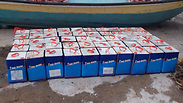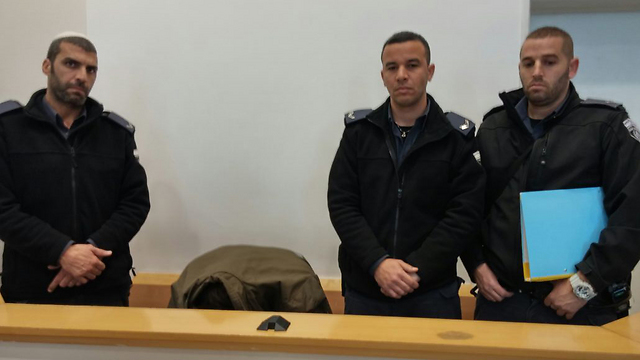
How did Israelis get away with smuggling for Hamas?
Dozens of Israelis helped Hamas' rocket industry - the group's military wing even had warehouses inside Israel; and if the defense establishment suspected, why didn't it act?
It's chilling; it's shameful; it's a security disgrace of the highest degree. The country that has been primarily responsible for helping Hamas to rebuild its military strength in the Gaza Strip following Operation Protective Edge is Israel – not Turkey, not Iran, not Qatar, and not Saudi Arabia.
Dozens of Israelis sold, stored and transported equipment for use in Hamas' rocket industry, its tunnel-building endeavors, and the communications systems employed by the organization's armed wing. This, in a nutshell, is the scandal exposed by the Shin Bet security service some two months ago. The indictment that was filed on Monday against three Israelis and five Palestinians involved in the affair is only the tip of the iceberg. It appears that a network of around 100 individuals – both Jewish and Arab citizens of Israel, and Palestinian traders from Gaza – was serving, knowingly or otherwise, Hamas' secret procurement mechanism in the Strip.

The story began some 18 months ago. Within its secret procurement mechanism, an intelligence entity for all intents and purposes, Hamas' armed wing set up a division that was charged with establishing commercial ties in Israel for the purpose of facilitating the free flow of equipment needed to rebuild its military infrastructure.
Already back then, the Hamas leadership sensed that smuggling via tunnels would become impossible because of the operations of the Egyptian Army in the Sinai, and that they needed an alternative method. This need intensified as a result of the massive destruction caused by Operation Protective Edge and the damage done to the organization's assets. This clandestine procurement mechanism made contact with a group of traders who owned companies in the Gaza Strip and had permits to do business with Israel.
In order to make it harder to track the activities of these companies in Israel, Hamas set up straw companies in Gaza that used the trading permits granted by the Coordinator of Government Activities in the Territories (COGAT). In total, over the past year and a half, this network managed to send 55,000 tons of iron to the Gaza Strip – directly into the hands of Hamas' military wing.
Purchasing metal in Israel was just one of the many activities in which this this secret mechanism was involved. It also purchased electronic equipment, communications systems, engines, fiber glass and more. Hamas' tunnel diggers, for example, asked for machines to help them remove the earth – so the procurement mechanism used its businessmen to obtain the necessary permits and acquire the machines. Nobody stopped the machines from getting into Gaza, and Hamas managed to build tunnels with Israel's direct assistance.
Hamas invested hundreds of millions of dollars in this project. It is patently clear that the organization paid way above the going rate for equipment purchased via Israel, since some of those involved needed to be bribed. Hamas' military wing even had warehouses inside Israel in which it stored the equipment it purchased from Israeli traders and where it prepared the equipment to be transported into Gaza via the Kerem Shalom border crossing.
Hamas' military was willing to pay a sum of NIS 1.5 million a month for the storage. Huge sums of money were also spent on generators and other allegedly civilian equipment, which never reached the people of Gaza. Instead, it went straight into the hands of Hamas militants. Some of the equipment that entered Gaza via Kerem Shalom was unloaded directly into Hamas' outposts and facilities.
From time to time, the Defense Ministry's border control officials seized some of the equipment, and COGAT even suspended the business permits of nine Gazan traders. But that was, it seems, a drop in the ocean. Hamas was able to overcome these setbacks by simply changing the names of the straw companies and by establishing new ones. Perhaps now the Shin Bet will manage to close the massive loophole that permitted Hamas to smuggle such dangerous materials into Gaza.
But there are still tough questions to be answered: Who is responsible for this massive and inconceivable failure? Who was supposed to keep track of what and how much equipment purchased in Israel was being transported into Gaza? Who are the people who get permission to trade in Israel? The Israeli defense establishment warned some of the Israeli businessmen not to do business with certain people in Gaza. If they knew something, why did they not act to halt it earlier? Why did they allow these businesses to continue to operate?
In theory, answers to all these questions can be found somewhere among the red tape of the Defense Ministry, COGAT, the Israel Defense Forces and the Shin Bet. In practice, it appears that everything there simply fell through the cracks.










